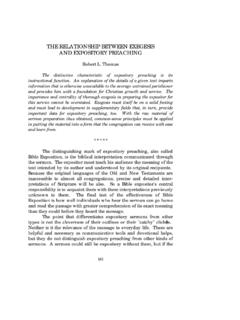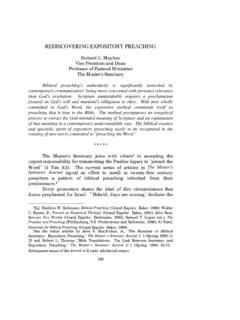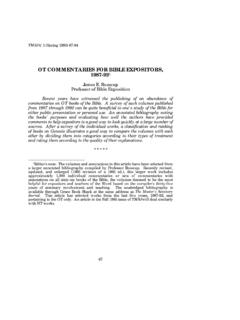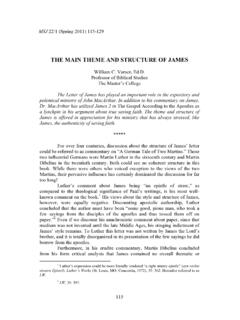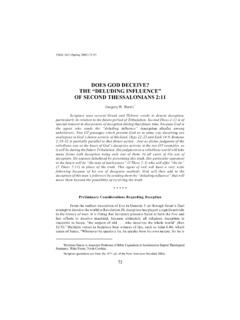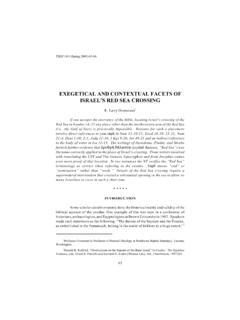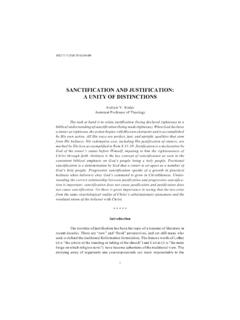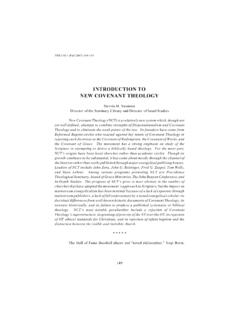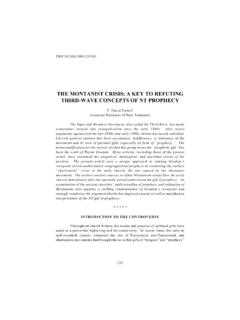Transcription of DELIVER THIS MAN TO SATAN (1 COR 5:5): A CASE STUDY IN ...
1 33 TMSJ 3/1 (Spring 1992) 33-45" DELIVER THIS MAN TO SATAN " (1 COR 5:5): A CASE STUDY IN CHURCH DISCIPLINES imon J. Kistemaker1 Professor of New TestamentReformed Theological SeminaryJackson, MississippiPart of understanding the difficult passage in 1 Cor 5:1-5 is theinterpretation of the words " DELIVER this man to SATAN " in 5:5. To explain thisstatement correctly, one must establish what the sin is that caused Paul todeliver the declaration. Then he should realize the responsibility of the localchurch in Corinth to deal with such a situation. The nature of the authoritybehind the directive needs also to be appreciated. Then details of thedisciplinary action itself need clarification.
2 The whole set of circumstancesemphasizes how important it is for local churches to implement church-disciplinary actions in dealing with sinning members and to use soundprinciples in doing so.* * * * *In his second epistle, the apostle Peter remarks that some thingsin Paul's letters are hard to understand (2 Pet 3:16). This is surely anunderstatement. Anyone who has studied Paul's first epistle to theCorinthians knows that a few passages are not only difficult tointerpret, they are enigmatic. Among others these include Paul's 1 This article has been adapted and enlarged from a segment of Dr.
3 Kistemaker'sforthcoming commentary on First Corinthians, with permission from Baker BookHouse, Grand Rapids, MI. Dr. Kistemaker is in the final year of almost twenty yearsof service as Secretary-Treasurer of the Evangelical Theological Society, aresponsibility he has fulfilled with distinction to the great enrichment of thecommunity of evangelical to DELIVER to SATAN the man who committed incest (5:5), thesign of authority on the head of a woman because of the angels (11:10),and the reference to the ones baptized for the dead (15:29). We havethe text of these verses, but could wish that Paul had incorporatedexplanatory footnotes along with this article, we will investigate the context,2 the significance,and the message of 1 Cor 5:5.
4 By studying the text carefully in thesetting of the preceding verses, we will gain a better understanding ofit and, at the same time, glean some principles for local churches tofollow in exercising church discipline. A personal translation of theparagraph of vv. 1-5 is in order as a start:1It is actually reported that there is immorality among you and of such akind that does not even happen among the Gentiles, namely, that a man hasthe wife of his father. 2 And you are arrogant! Should you not rather begrieved? Put the man who practiced this deed out of your midst. 3 For eventhough I am absent in the body but present in spirit, I have already judgedthe man who has so committed this as if I were present.
5 4 When you cometogether and I am with you in spirit with the power of our Lord Jesus, 5inthe name of our Lord Jesus DELIVER this man to SATAN for destruction of theflesh that his spirit may be saved in the day of our CAUSE OF CHURCH DISCIPLINE: INCESTPaul had been told that someone in the church had committedincest but that the members of the Corinthian church had not censuredthis person. In an earlier letter (cf. 5:9) Paul had warned theCorinthians not to associate with immoral people. Apparently, theyhad paid little if any attention to his instruction because when a manhad committed incest, the church failed to act.
6 Now Paul instructs thechurch to remove this man and his heinous sin from their midst. Indeed both the man, because of incest, and the church, because offailure to impose discipline, are guilty of sin before God."There is immorality among you" (v. 1). The information Paulgives is scant. He has received a report on immorality that pertains to 2 Some issues of textual and exegetical significance in the larger context do notdirectly impinge on an understanding of v. 5, and so will not be treated. The focus isupon obtaining a grasp of the explicit directive, " DELIVER this man to SATAN ." DELIVER This Man .. 35a male member of the church and the wife of the man's father.
7 We donot know whether the woman is a Christian or the father is still living. We know only that the case of incest concerns a man and hisstepmother and that this immoral conduct is of a kind that even theGentiles to Paul, the members of the church in Corinth wereacquainted with this case of incest. The first word in the Greeksentence, lvw (hols), is an adverb that means either "actually,""generally," or "altogether." It conveys more the concept ofthoroughness than of universality3 and signifies that the whole storyhas been reported. Because it stands first in the sentence, the adverb isemphatic and modifies the impersonal verb it is reported.
8 Paul is notinterested in revealing who the reporter is or how he has received thenews. He only states the fact and does not provide details, except tosay that in an earlier letter he had warned the Corinthians not toassociate with immoral people (cf. v. 9)."A man has the wife of his father" (v. 1). In Jewish circles, thewording wife of his father meant "stepmother." Although not physicallyrelated to the son, yet because of her marriage vows to his father, shewould plunge the son into sin by having sexual relations with him. God repeatedly told the Israelites, "Do not have sexual relations withyour father's wife; that would dishonor your father" (Lev 18:8; 20:11;Deut 22:30; 27:20).
9 If a son purposely had sexual relations with hisstepmother, the community would have to put him to death bystoning. Would a son be free to marry her if his father had passedaway? In the first two centuries of the Christian era, some Jewishrabbis condemned a marriage of a proselyte son and his paganstepmother while others tolerated Is it possible that this tolerancewas known among the Jewish people and proselytes in Corinth? Perhaps, but we do not know. In any case, Paul condemns the deedand calls attention to the conduct of the Gentiles in this matter. 3 The Simple English Bible has, "It is being told everywhere.
10 " By contrast, the JBreads, "I have been told as an undoubted fact." 4 Str-B, 3 The Master's Seminary JournalPaul fails to point out whether the father of this church memberhas passed away. He does not describe the stepmother as a widow,but gives the impression that the father is still alive (cf. Gen 35:22;Amos 2:7). He writes that this sin is "of such a kind that does not evenhappen among the Gentiles" (v. 1).5 The mention of the name Gentiles is a means to emphasize theseverity of the sin that the church member had committed. The writeralluded to the Gentiles to prod the Christian community to action. Hedid not want them to let one member put the entire congregation toshame.
